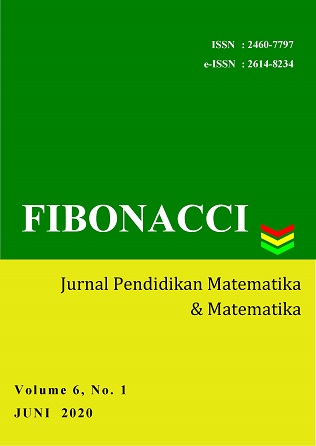EFEKTIVITAS PENGGUNAAN EDMODO DALAM PELAKSANAAN ULANGAN HARIAN MATEMATIKA
Main Article Content
Abstract
Article Details
Authors who publish with this journal agree to the following terms:
- Authors retain copyright and grant the journal right of first publication with the work simultaneously licensed under a Creative Commons Attribution License that allows others to share the work with an acknowledgement of the work's authorship and initial publication in this journal.
- Authors are able to enter into separate, additional contractual arrangements for the non-exclusive distribution of the journal's published version of the work (e.g., post it to an institutional repository or publish it in a book), with an acknowledgement of its initial publication in this journal.
- Authors are permitted and encouraged to post their work online (e.g., in institutional repositories or on their website) prior to and during the submission process, as it can lead to productive exchanges, as well as earlier and greater citation of published work (See The Effect of Open Access).
References
Al-qdah, M., & Ababneh, I. (2017). Comparing Online and Paper Exams : Performances and Perceptions of Saudi Students. International Journal of Information and Education Technology. Vol. 7(2), pp: 2015–2018.
Arkorful, V., & Abaidoo, N. (2014). The role of e-learning , the advantages and disadvantages of its adoption in Higher Education . International Journal of Education and Research. Vol. 2(12), pp: 397–410.
Ghavifekr, S., & Rosdy, W. A. W. (2015). Teaching and Learning with Technology : Effectiveness of ICT Integration in Schools Teaching and Learning with Technology : Effectiveness of ICT Integration in Schools. International Journal of Research in Education and Science. Vol. 1(2).
Kearney, J., Fletcher, M., & Bartlett, B. (2002). Computer-Based Assessment : Its Use and. Learning in Technology Education, (Thelwall 1999). pp: 235–242.
Nwigbo, S., & Madhu, B. K. (2016). Impact of ICT on the Teaching and Learning Process. IOSR Journal of Mobile Computing & Application (IOSR-JMCA). Vol. 3(2), pp: 1–7.
Pakpahan, R. (2016). Model Ujian Nasional Berbasis Komputer : Manfaat Dan Tantangan Computer-Based National Exam Model : Its Benefits And Barriers. Vol 1(April), pp: 19–36.
Panyajamorn, T., Suanmali, S., Kohda, Y., & Al, E. (2018). Effectiveness Of E-Learning Design And Affecting Variables In Thai Public Schools. Malaysian Journal of Learning and Instruction. Vol. 15(1), pp: 1–34.
Satria, D., & Wati, L. (2016). Perancangan Ujian Online Menggunakan Model Computer Based Assesment Berbasis Client-Server ( Studi Kasus : SMA PGRI Kota Payakumbuh). Vol. 1(1), pp: 57–67.
Shah, S. J., & Stefaniak, J. E. (2016). A Review of the Effectiveness of e-learning on Knowledge and Skill Acquisition in Medical Education Old Dominion University 4101-A Education Building University of Georgia 208 River ’ s Crossing 850 College Station Road. pp:160–168.
Singleton, C. (2001). Computer-based assessment in education. Educational and Child Psychology. Vol. 18(3), pp: 58–74.
Somayeh, M., Dehghani, M., Mozaffari, F., Ghasemnegad, S. M.,
Hakimi, H., & Samaneh, B. (2016). The effectiveness of E- learning in learning : A review of the literature PhD of nursing , Instructor , Department of nursing , Lahijan Branch , Islamic Azad university , Instructor , Department of Operating Room , Faculty of Medical Sciences , Birjand Un. International Journal of Medical Research & Health Sciences. Vol. 5(2), pp: 86–91.
Studies, I. E. (2008). ICT in Schools. Dublin: Brunswick Press.
Susanti, R. D. (2018). Penerapan Edmodo pada Pemberian Tes Formatif Mahasiswa Pendidikan Profesi Guru Matematika. Vol. 7(2), pp: 221–228.

